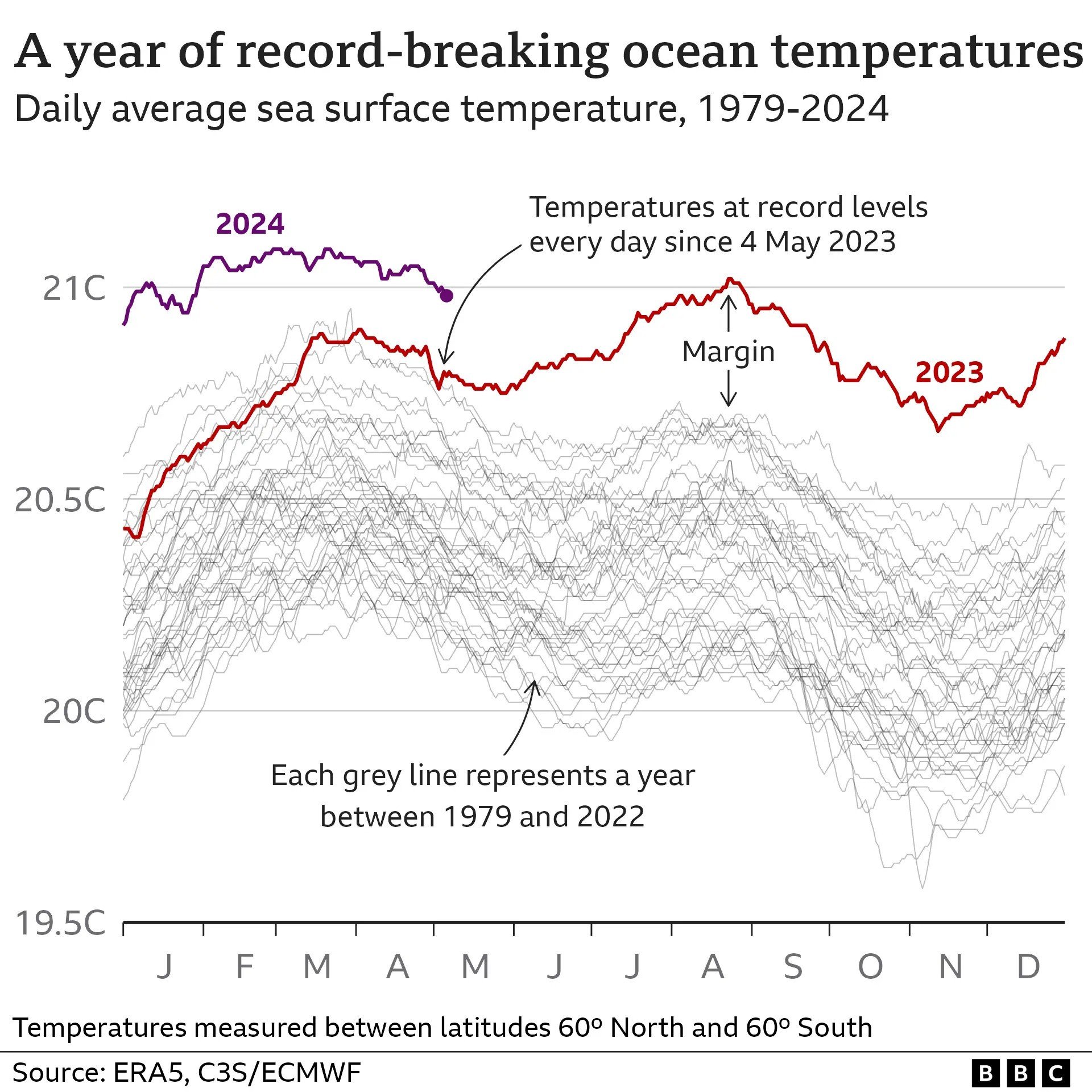Sharks threatened by record-breaking year of ocean heat
Driven by the effects of climate change, the world's oceans have been consistently breaking temperature records every day for the past year, as per an analysis conducted by the BBC. Nearly 50 days have surpassed previous temperature highs for their respective times of the year by the largest margins observed since the advent of satellite monitoring. The primary culprits behind this phenomenon are greenhouse gases, though the natural climate phenomenon known as El Niño has also contributed to warming the seas.
The heightened ocean temperatures have inflicted significant damage on marine life, leading to a widespread occurrence of coral bleaching. This analysis is based on data provided by the EU's Copernicus Climate Service, which has further confirmed that last month marked the warmest April on record globally in terms of air temperatures. This extends the streak of setting monthly temperature records to 11 consecutive months.
For many years, the world's oceans have served as a buffer against the impacts of climate change by absorbing a substantial portion of the carbon dioxide emissions and excess heat generated by human activity. However, over the past year, there has been alarming evidence indicating that the oceans are struggling to mitigate these effects. Since March 2023, the average surface temperature of the global oceans has consistently risen above the long-term norm, reaching a new peak in August.
Recent months have shown no relief, with the global average daily sea surface temperature hitting a record high of 21.09°C in February and March of this year, according to Copernicus data. Every day since May 4, 2023, has broken the daily temperature record for its respective time of the year, with some days experiencing significant margins.
Around 47 days have shattered the previous temperature records for their respective dates by at least 0.3°C, based on BBC analysis of Copernicus data. Never before in the satellite era has the margin of temperature records been this substantial. The most significant record-breaking days were observed on August 23, 2023, January 3, 2024, and January 5, 2024, surpassing the previous highs by approximately 0.34°C.
“Climate change is having profound effects on the world’s oceans, impacting shark and ray species in ways that threaten their survival. As water temperatures rise, the metabolism of sharks increases, forcing them to swim faster to deliver enough oxygen to their bodies. This results in the need to consume more food for energy or suppress growth and reproduction to compensate.
Rowan Byrne, an Irish marine biologist, shares insights into how these changes affect local species. “Our charismatic and beautiful basking sharks rely on plankton for survival,” says Byrne. “As our climate continues to change, this could alter ocean currents and plankton distribution in our waters.” This shift could mean that basking sharks face challenges in finding enough food and may even need to alter their migration patterns.
The warming ocean temperatures and more intense storms caused by climate change are impacting not just the prey availability and habitat quality for migratory sharks and rays, but also the delicate balance of marine ecosystems.
Every year, we learn more about the incredible species that inhabit our coastlines,” notes Byrne. “However, without action to address climate change, we risk losing these iconic and essential species from our oceans.”
Professor Mike Meredith from the British Antarctic Survey expresses deep concern over the escalating oceanic heat and its implications, highlighting the urgency for action. This human-induced ocean warming has already begun to significantly impact global marine life and may potentially alter the seasonal cycle of sea temperatures, as suggested by recent studies.
One of the most notable consequences of the recent oceanic warmth is the widespread bleaching of coral reefs worldwide. These vital ecosystems turn white and perish due to excessive water temperatures, posing a significant threat to marine biodiversity, as coral reefs support around a quarter of all marine species - including sharks.
El Nino
A significant contributing factor to the heightened impact on seas worldwide over the past year has been the El Niño weather phenomenon, which has compounded the effects of human-induced emissions of warming gases.
El Niño entails the emergence of warmer waters at the surface of the Pacific Ocean, consequently elevating the global average temperature. This phenomenon became pronounced in June 2023, following an extended period of cooler La Niña conditions, reaching its peak in December before gradually dissipating.
However, even ocean basins typically unaffected by El Niño have witnessed unprecedented marine heatwaves, puzzling scientists as they endeavor to unravel the underlying dynamics.
If you would like to write for The Daily Jaws, please visit our ‘work with us’ page
For all the latest Jaws, shark and shark movie news, follow The Daily Jaws on Instagram, Twitter and Facebook.



